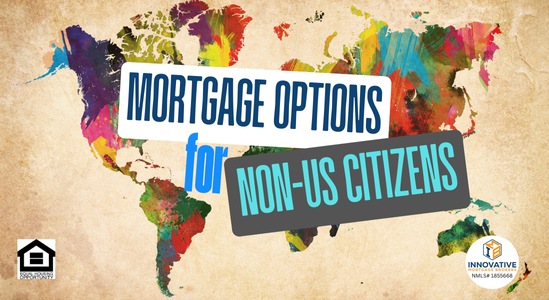Mortgage rate volatility, oil shocks, and why execution matters more than quotes When a war…
Homeownership for Non-U.S. Citizens: Breaking Down Your Mortgage Options
Homeownership for Non-U.S. Citizens: Breaking Down Your Mortgage Options
Buying a home in the U.S. as a non-citizen can feel overwhelming, but there are clear pathways available. The right loan depends on your residency status, financial profile, and long-term goals. While permanent residents (Green Card holders) can access nearly all major programs, non-permanent residents have some restrictions—most notably, FHA loans are not available to them.
The good news: Conventional loan programs from Fannie Mae and Freddie Mac do allow financing for many non-U.S. citizens, provided they can document lawful residency, income stability, and creditworthiness.
Key Factors Lenders Look At
Regardless of loan type, here’s what matters most:
- Residency Status – Permanent vs. non-permanent, with valid documentation such as a Green Card, visa, or Employment Authorization Document (EAD).
- Employment & Income Stability – Proof of steady work and the likelihood it will continue.
- Credit History – A U.S. credit profile is preferred, but in some cases, lenders may accept foreign credit history or alternative credit references.
- Assets & Funds – Verification that down payment and closing cost funds belong to the borrower and are sourced properly.
Conventional Options: Fannie Mae & Freddie Mac
Fannie Mae
Fannie Mae will finance borrowers who can document lawful residency. This means having:
- A Social Security Number (SSN) or Individual Taxpayer Identification Number (ITIN), and
- Valid, current documentation of status (Green Card, EAD, or qualifying visa).
If U.S. credit is limited, Fannie Mae may allow use of foreign credit references to help establish creditworthiness. Assets transferred from abroad are acceptable if properly documented.
Key takeaway: Fannie Mae is flexible for borrowers who can prove stability, even if their U.S. credit is thin.
Freddie Mac
Freddie Mac also allows financing for permanent and non-permanent residents with lawful status. Borrowers must provide documentation of residency and employment.
Important note: Freddie Mac does not accept DACA recipients.
Key takeaway: A good fit for non-citizens with steady income and legal residency status.
FHA Loans: Available Only to Permanent Residents
FHA loans are not an option for non-permanent residents. They are limited to U.S. citizens and lawful permanent residents. While FHA is known for flexible credit requirements and lower down payments, this route unfortunately isn’t available if you’re on a temporary visa.
What This Means for You
- Permanent residents (Green Card holders): Eligible for most loan programs, including FHA, VA (if military-eligible), USDA, and conventional.
- Non-permanent residents (work visas, EAD holders, DACA): Eligible for many conventional loan programs (Fannie Mae, Freddie Mac), but not FHA.
How to Maximize Your Chances of Approval
- Get your residency documentation in order before applying.
- Build or establish U.S. credit, or be prepared to provide foreign credit references.
- Transfer down payment funds to a U.S. account early, with clear paper trails.
- Work with a lender experienced in non-U.S. citizen mortgages.
About Us
At Innovative Mortgage Brokers, we specialize in helping clients from diverse backgrounds navigate the U.S. mortgage process. Whether you’re a permanent resident looking for the widest range of options or a non-permanent resident navigating the limits of conventional loans, we’ll help match you with the right program. With access to 30+ lenders, we can often find solutions where others stop at “no.”





